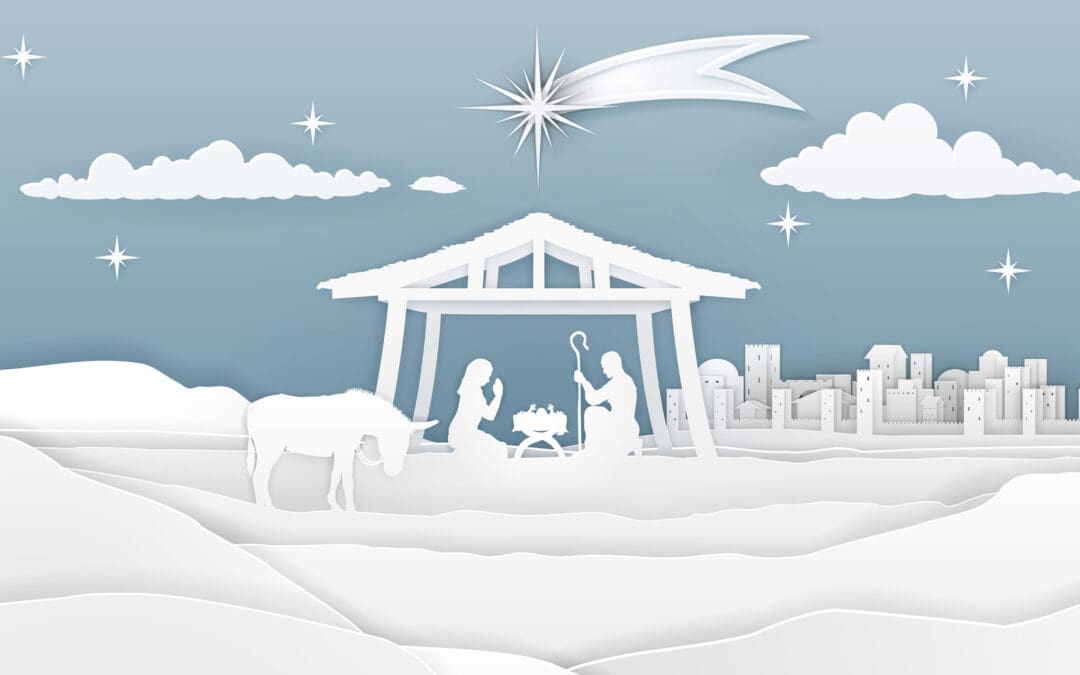Today I listened as my eight-year-old son read the first part of the Christmas story – the part where Mary learns she’s pregnant. This story of the most famous “unplanned pregnancy” in history reads like a heart-warming tale – especially in the children’s Bible. How wonderful that Mary would be the mother of the Messiah! How amazing that she would be the one chosen to carry and deliver him!
But I wonder if we don’t miss an even bigger miracle when we cover this story in Christmas cheer. I wonder if we fail to see the miracle of Mary walking through a “crisis” pregnancy peacefully.
Mary wasn’t married. She hadn’t been with Joseph or any man. She knew she’d have a lot of explaining to do when people noticed her baby bump. If I were in her position, I would have begged the angel Gabriel to stick around so he could help me explain it to people!Of course there are countless lessons we can learn from Mary’s response to this situation. But there are three lessons we can readily apply to helping any woman who is facing a crisis pregnancy.
1. Don’t Be Afraid.
Though being pregnant outside of marriage is common in our day, in ancient Israel, the consequences of claiming to be a virgin and then showing up pregnant when you’re betrothed to be married, would be stoning – just the same as if she had committed adultery.
How frightening it must have been for her to hear that news? How scared would this girl (some estimate she may have been as young as twelve years old) have been to hear the news that she was having a baby?
Fortunately, Mary had great faith. She and Joseph had been given all the information they needed to move forward with their marriage and protect baby Jesus.
But it’s important to remember that every woman facing a crisis pregnancy feels afraid. She may be scared of what others will say. She may be frightened at the prospect of becoming a mother. Or she may be terrified as she thinks of the future and wonders what life would be like with a child.
Gabriel specifically told Mary, “Do not be afraid.” But, notice, he didn’t end the sentence there. Gabriel also told her that she had found favor with God.
As we work to encourage women facing crisis pregnancies and try to help alleviate their fears, we must not forget that last part. Women must be reminded of God’s unconditional love. The only way to truly free people from the bondage of fear is to help them understand how much God loves them.
Even women who grew up in the church may suddenly question God’s love when they find themselves pregnant outside of marriage. This can compound their fears and doubts about carrying a baby to term. But as people dedicated to abundant life, we have the opportunity to remind women and men facing unplanned pregnancies that God still loves us, even when we stray from his plan. God’s forgiveness covers all si – even if it results in pregnancy.
The ability to “fear not” only comes with a real understanding of the truth of the Gospel.
2. Children are a blessing.
Gabriel told Mary she was “highly favored” because she would be bearing God’s son. Scripture tells us many times over: children are a blessing. Likewise, the Bible says that those who are given children are blessed. As the Psalmist puts it, they are rewarded.
We can never look at pregnancy as a curse. God doesn’t say, “Oops, I didn’t mean for them to get pregnant!” He knows every unborn baby and knits each together in his or her mother’s womb. (Psalm 119)
Unplanned pregnancies still yield blessings. Crisis pregnancies don’t negate the value, worth, and reward of a child.
Encouraging those who find themselves “unexpectedly expecting” with this truth may help shift the focus away from the ways a baby may “ruin” or “alter” a woman’s future and on to the truth that every baby is a blessing.
3. Shame is always the wrong response.
In my son’s Bible, the story spells out the kindness of Joseph. He was entitled to divorce Mary and could have had her stoned for (what seemed like) a betrayal of their vows. But instead of shaming her, Joseph decided to divorce her quietly. He determined to protect her, even though he’d (seemingly) been wronged. Eventually the angel of the Lord came and cleared everything up. But, even before Joseph knew the full story, he refused to shame.
I wonder if this isn’t a good reminder for us, too. We must always lead with kindness. Shame, whether through our thoughts or our words, never brings us closer together. Instead, shame separates and drives a wedge between us.
Those facing an unplanned pregnancy need our love and support during this time. The Bible says it’s God’s kindness that leads us to repentance. Likewise, our display of kindness does a whole lot more to warm hearts than our condemnation.
What lessons have you learned from the Nativity Story? Please let me know in the comments!

